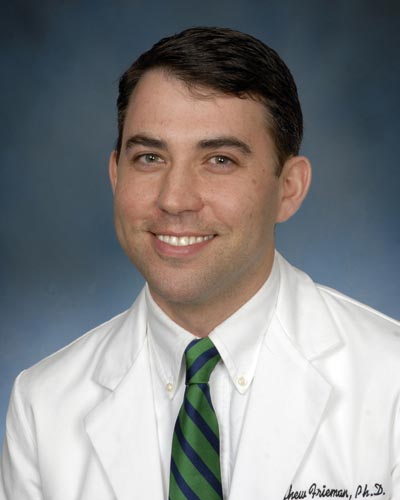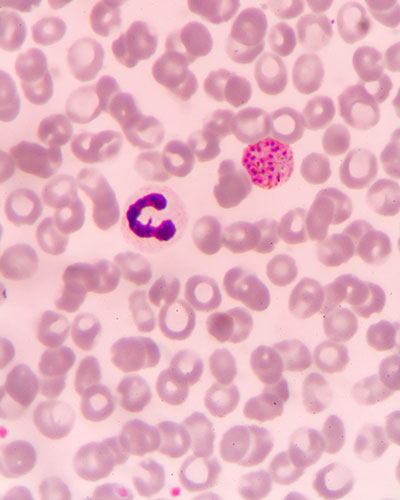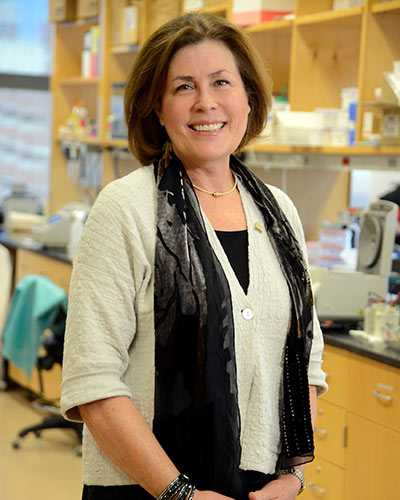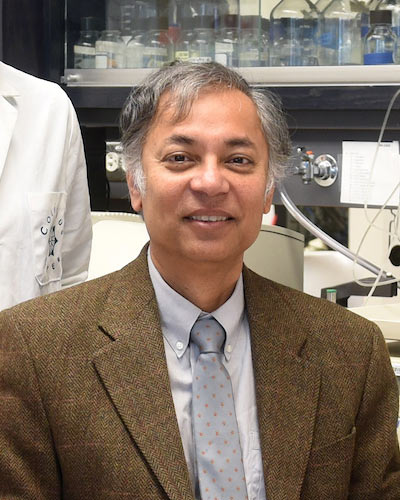August 13, 2019 | Joanne Morrison

Institute for Genome Sciences Scientists at UM School of Medicine Shed Light on How Certain Vaginal Microbiome Can Help Protect Against Sexually Transmitted Infections
The vaginal microbiome is believed to protect women against Chlamydia trachomatis, the etiological agent of the most prevalent sexually transmitted infections (STIs) in developed countries. New research by the University of Maryland School of Medicine (UMSOM) shows how the microbiome can either protect or make a woman more susceptible to these serious infections.
The research is important amid a rising number of cases of chlamydia worldwide. In the U.S. alone, 1.7 million cases of chlamydia were reported in 2017, a 22% increase since 2013, according to data from the Centers for Diseases Control and Prevention (CDC).
“Chlamydia is a major growing health issue in the U.S., and more work is needed to understand why some women are apparently naturally protected while other are not,” commented Jacques Ravel, PhD, Professor of Microbiology and Immunology, Associate Director and Senior Scientist at the Institute for Genome Sciences (IGS) at UMSOM. Dr. Ravel is also a Principal Investigator for this research. “Our novel research aims to decipher the mechanistic and functional underpinnings of communication between the host and the cervicovaginal microbiome to better understand resistance and susceptibility to this infection.”
An Important Mechanism in Vaginal Microbiome
While Lactobacillus-dominated microbiota in a woman’s vagina has long been suspected to provide a protective barrier against STIs like chlamydia, investigators at IGS and the University of Maryland School of Dentistry (UMSOD) are reporting for the first time a mechanism enabling specific types of cervicovaginal microbiome to predispose cells in the vagina and cervix to resist chlamydial infection.
“We will now be able to leverage these microbiomes to identify women at risk of infections, but more importantly to develop improved strategies to restore an optimal protection when it is lacking. Unlike our genes, the vaginal microbiome can be modulated to increase protection against chlamydia, but also against other sexually transmitted infections, including HIV,” said Dr. Ravel of the research, which was published today in mBio, “Cervicovaginal Microbiota-Host Interaction Modulates Chlamydia trachomatis Infection.”
The investigators have shown previously that five major types of vaginal microbiome exist, four of which are dominated by a different species of Lactobacillus, while the fifth has very low numbers of Lactobacillus bacteria and is associated with an increased risk of adverse outcomes including STIs, such as HIV, and even premature births.
The current research showed that Lactobacillus iners, a bacterium actually commonly found in the vagina did not optimally protect human cells against chlamydial infection, while products of Lactobacillus crispatus, another Lactobacillus species frequently found in the vagina, did.
Previously published research has hinted at L. iners being a risk factor for STI; however, the mechanism by which these bacteria were specifically suboptimal at protecting women against STI has remained elusive. Like other Lactobacillus, L. iners produces lactic acid, but only the L isoform. The researchers found that D-lactic acid, not L-lactic acid, down-regulates cell cycling through epigenetic modifications thus blocking C. trachomatis entry into the cell, one of the pathogen key infectious process, among other processes.
Thus, a rather unexpected result of this study is that the vaginal microbiome does not affect the pathogen per se, but drives susceptibility or resistance to infection, by modifying the cells that line up the cervicovaginal epithelium. The researchers further demonstrated that exposure to optimal vaginal microbiota provided long term protection, which has major implication on how a woman is protected. These mechanisms are now being exploited to develop strategies to optimize protection against C. trachomatis infections but also other STIs.
Patrik Bavoil, PhD, Professor & Chair, Department of Microbial Pathogenesis, University of Maryland School of Dentistry, a well-known expert in C. trachomatis biology and pathogenesis, is a Co-Principal Investigator with Dr. Ravel on the NIH funding that supported this study. The investigators also collaborated with Larry Forney, PhD at the University of Idaho.
“Chlamydia is reputed to be a most difficult microorganism to study. By hiding inside cells, the pathogen routinely avoids antimicrobial host defenses. By causing mostly asymptomatic infection, it often escapes detection by both the infected host and the physician alike,” said Dr. Bavoil. “What we have done in this study through several years of hard work by dedicated researchers is to provide, for the first time, a huge, new stepping stone on which future translational research to exploit the microbiome in the fight against chlamydial infection and disease, can be based.”
This research was supported by the National Institute for Allergy and Infectious Diseases (NIAID) of the National Institutes of Health (NIH) under award numbers U19A1084044 and UH2A1083264.
“This groundbreaking research will stimulate the development of novel antibiotic sparing solution to modulate the cervicovaginal microbiota to protect women from STI, but also from adverse reproductive outcomes such as preterm birth,” said UMSOM Dean E. Albert Reece, MD, PhD, MBA, who is also the Executive Vice President for Medical Affairs, University of Maryland and the John Z. and Akiko K. Bowers Distinguished Professor.
About the University of Maryland School of Medicine
Now in its third century, the University of Maryland School of Medicine was chartered in 1807 as the first public medical school in the United States. It continues today as one of the fastest growing, top-tier biomedical research enterprises in the world, with 43 academic departments, centers, institutes, and programs. The School of Medicine has a faculty of more than 3,000 physicians, scientists, and allied health professionals, including members of the National Academy of Medicine and the National Academy of Sciences, and a distinguished recipient of the Albert E. Lasker Award in Medical Research. With an operating budget of more than $1.2 billion, the School of Medicine works closely in partnership with the University of Maryland Medical Center and Medical System to provide research-intensive, academic and clinically based care for more than 1.2 million patients each year. The School has over 2,500 students, residents, and fellows, and nearly $575 million in extramural funding, with most of its academic departments highly ranked among all medical schools in the nation in research funding. As one of the seven professional schools that make up the University of Maryland, Baltimore campus, the School of Medicine has a total workforce of nearly 7,000 individuals. The combined School and Medical System (“University of Maryland Medicine”) has an annual budget of over $6 billion and an economic impact of more than $15 billion on the state and local community. The School of Medicine faculty, which ranks as the 8th highest among public medical schools in research productivity, is an innovator in translational medicine, with 600 active patents and 24 start-up companies. The School works locally, nationally, and globally, with research and treatment facilities in 36 countries around the world. Visit medschool.umaryland.edu
About the Institute for Genome Sciences
The Institute for Genome Sciences, founded in 2007, is an international research center within the University of Maryland School of Medicine. Comprised of an interdisciplinary, multidepartment team of investigators, the Institute uses the powerful tools of genomics and bioinformatics to understand genome function in health and disease, to study molecular and cellular networks in a variety of model systems, and to generate data and bioinformatics resources of value to the international scientific community.
igs.umaryland.edu
About the University of Maryland School of Dentistry
The University of Maryland School of Dentistry, the world’s first dental college, offers superlative educational programs in oral health. As one of six professional schools and an interdisciplinary Graduate School on the University of Maryland, Baltimore’s 71-acre campus, it is part of a thriving academic health center that combines groundbreaking biomedical research and exceptional patient care. The school is Maryland’s predominant provider of comprehensive and emergency oral health services. dental.umaryland.edu
Contact
Department of Anesthesiology
(410) 328-6120 (phone)
(410) 328-5531 (fax)
swalsh@som.umaryland.edu
Joanne Morrison
Director of Marketing and Public Relations
University of Maryland School of Medicine
jmorrison@som.umaryland.edu
Office: (410) 706-2884
Mobile: (202) 841-3369
Related stories

Wednesday, August 28, 2024
Leading Computational Scientist and Oncology Researcher Elana Fertig, PhD, Appointed as New Director of the Institute for Genome Sciences at the University of Maryland School of Medicine
University of Maryland School of Medicine (UMSOM) Dean Mark T. Gladwin, MD, announced today the appointment of Elana J. Fertig, PhD, FAIMBE, as the new Director of the School’s Institute for Genome Sciences (IGS). She is an internationally-recognized researcher known for her work in integrating spatial multi-omics technologies with mathematical models to develop a new predictive medicine paradigm in cancer. Spatial technologies allow researchers to learn about any cell type inside of natural tissue, including gene activity and cell interactions.

Thursday, July 28, 2022
Researchers Discover One of the Largest Known Bacteria-to-Animal Gene Transfer Inside a Fruit Fly
A fruit fly genome is not a just made up of fruit fly DNA – at least for one fruit fly species. New research from the University of Maryland School of Medicine’s (UMSOM) Institute for Genome Sciences (IGS) shows that one fruit fly species contains whole genomes of a kind of bacteria, making this finding the largest bacteria-to-animal transfer of genetic material ever discovered. The new research also sheds light on how this happens.

Monday, September 20, 2021
UM School of Medicine Receives $7.5 Million Grant to Create Complex Model of Female Reproductive Tract to Study Infections
Researchers at the Institute for Genome Sciences (IGS) at the University of Maryland School of Medicine have received a $7.5 million federal grant to create a complex model of the female reproductive system in order to study sexually transmitted infections (STIs). They plan to create a realistic 3D model that integrates vaginal and cervical epithelial cells and the bacteria that colonize these cells, called a microbiome. They aim to use this model to identity factors that play a role in chlamydia and gonorrhea infections experienced by a growing number of women in the U.S. and worldwide.

Thursday, March 18, 2021
UM School of Medicine Helps Maryland Conduct State-Wide Sequencing of Variants in Positive COVID-19 Test Specimens
In an effort to monitor the spread of COVID-19 variants in the State of Maryland, University of Maryland School of Medicine (UMSOM) Dean E. Albert Reece, MD, PhD, MBA, announced that UMaryland Genomics at UMSOM will perform genome sequencing of variants in at least 10 percent of COVID-19 test samples, reaching an important benchmark set by the federal government to help control the spread of these variants.

Tuesday, December 03, 2019
UM School of Medicine Researchers Institute for Genome Sciences' Researchers Discover Potential New Treatment for Tropical Parasitic Disease Using Genomics
Using innovative RNA sequencing techniques, researchers at the University of Maryland School of Medicine (UMSOM) Institute for Genome Sciences identified a promising novel treatment for lymphatic filariasis, a disabling parasitic disease that is difficult to treat. The potential new therapy is an experimental cancer drug called JQ1 and targets proteins found prominently in the worm’s genome; it appears to effectively kill the adult worms in a laboratory setting, according to the study which was published today in the journal mSystems.

Friday, October 18, 2019
Diabetes Worsens Respiratory Illness Due to Abnormal Immune Response, UM School of Medicine Study Finds
Since the Middle East respiratory syndrome coronavirus (MERS-CoV) first emerged in Saudi Arabia in 2012, there have been more than 2,400 confirmed cases of the infection, resulting in greater than 800 deaths – an alarming fatality rate of 35 percent. For this reason, researchers have been eager to identify any risk factors that contribute to the development of severe or lethal disease. Current clinical evidence points to diabetes as a major risk factor in addition to other comorbidities including kidney disease, heart disease, and lung disease.

Thursday, April 04, 2019
UM School of Medicine's Institute for Genome Sciences Awarded $17.5 Million Grant for Infectious Disease Research
The Institute for Genome Sciences (IGS) at the University of Maryland School of Medicine (UMSOM) was awarded $17.5 million from the National Institute of Allergy and Infectious Diseases (NIAID) to fund the IGS Genome Center for Infectious Diseases (GCID) for another five years.

Wednesday, March 27, 2019
New Study Finds That Bacteria and Immunity in the Cervix May be Key to Predicting Premature Birth
Spontaneous preterm birth (sPTB), defined as birth before 37 weeks of gestation, and the related complications, are the largest contributors to infant death in the United States and worldwide, according to the World Health Organization. Researchers at the University of Maryland School of Medicine (UMSOM) have discovered that bacteria and innate immune factors in a woman’s birth canal and cervix may increase the risk of spontaneous preterm birth or provide protection against such births.

Tuesday, February 12, 2019
UMSOM Scientists Call for Unrestricted Usage of Public Genome Data
Researchers at the Institute for Genome Sciences (IGS) at the University of Maryland School of Medicine (UMSOM) called for open access to genome data, stating that unrestricted usage is needed for progress in combating the world’s most serious diseases.

Friday, February 08, 2019
University of Maryland School of Medicine Genome Scientists Develop Novel Approaches to Studying the Most Widespread Form of Malaria
Scientists at the Institute of Genome Sciences (IGS) at the University of Maryland School of Medicine (UMSOM) have developed a novel way with genome sequences to study and better understand transmission, treat and ultimately eradicate Plasmodium vivax, the most widespread form of malaria.

Thursday, September 27, 2018
University of Maryland School of Medicine Scientist Receives Prestigious Microbiome Award
Owen White, PhD, professor of epidemiology and public health, and Associate Director for Informatics at the Institute for Genome Sciences (IGS) at the University of Maryland School of Medicine (UMSOM), has received the 2018 Microbiome Pioneer Award. The prestigious honor is part of the Bioinformatics for the Microbiome Symposium organized by Stanford University. The microbiome is the name given collectively to the community of trillions of microbial organisms that live on and within our bodies.

Friday, September 14, 2018
Nationwide Research on African-American Kidneys Hopes to Unravel Genetic Variation That Increases Disease Risk
With African-Americans developing kidney failure at rates four to five times higher than Americans of European descent, a groundbreaking nationwide study will track nearly every African-American donor kidney over the next five years.

Monday, May 14, 2018
New Research: Some Gut Bacteria May Protect Against Intestinal Infection
Scientists at the University of Maryland School of Medicine (UMSOM) have for the first time found evidence that the presence of a key species in the human gut microbiome is associated with protection from infection with typhoid fever. If the research is borne out, it could offer an exciting new way to reduce intestinal infections from microbes.

Thursday, March 22, 2018
With Big Data, Researchers Identify New Targets for Lung Disease Treatments
Every year, approximately 12 million adults in the U.S. are diagnosed with Chronic Obstructive Pulmonary Disease (COPD), and 120,000 die from it. For people with COPD, Haemophilus influenzae, a bacterium, can be particularly dangerous.

Tuesday, December 19, 2017
UMSOM Scientists Identify Key Factors that Help Microbes Thrive in Harsh Environments
Three new studies by University of Maryland School of Medicine (UMSOM) scientists have identified key factors that help microbes survive in harsh environments.

Wednesday, May 25, 2016
UMSOM Researchers Develop New Way to Decode Large Amounts of Biological Data
A University of Maryland School of Medicine researcher has helped develop an innovative computing technique that, on very large amounts of data, is both faster and more accurate than current methods. To spur research, a program using this technique is being offered for free to the biomedical research community.
